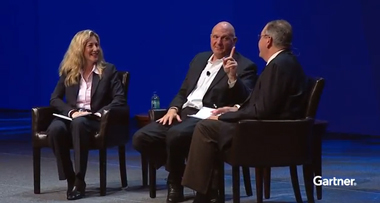News
Ballmer: Office App for iPad '100 Percent in Progress'
- By Gladys Rama
- October 09, 2013
A touch-optimized Microsoft Office app for Apple's iPad is less a matter of "if" and more a matter of "when," according to Microsoft CEO Steve Ballmer.
Ballmer was the guest interviewee during Tuesday's keynote presentation at Gartner's ITxpo 2013 event, taking place in Orlando, Fla. It was Ballmer's tenth appearance at the event and, given his intent to retire within the next 10 months, likely his last. The interview was moderated by Gartner distinguished analyst Tiffani Bova and Gartner fellow David W. Cearley.
The discussion covered a number of topics, including the recent "One Microsoft" reorganization, Microsoft's growing focus on enabling "high-value activities" for users, and the "devices and services" direction of the company.
In response to a moderator question about when Microsoft will make Office available for touch-centric platforms like the iPad and Windows 8, Ballmer confirmed that an app is in the works, but was vague about when it would become available.
"Word, PowerPoint and Excel are all authoring tools. They are optimized for use with keyboards and mice. Last time I checked, the iPad didn't have a paradigm for keyboard and mice," Ballmer said. "So iPad will be picked up when we do what I would call not just a touch-enabled, but a touch-first user interface for Word, Excel and PowerPoint. That is in progress -- for both Windows 8 and other platforms."
Ballmer hedged when asked about a specific timeframe for delivery. "It is really in progress. It is definitively, 100 percent in progress," he reiterated.
 (L to R) Gartner analyst Tiffani Bova, Microsoft CEO Steve Ballmer and Gartner fellow David W. Cearley onstage at Tuesday's Gartner ITxpo 2013 keynote. Source: Gartner/YouTube.
(L to R) Gartner analyst Tiffani Bova, Microsoft CEO Steve Ballmer and Gartner fellow David W. Cearley onstage at Tuesday's Gartner ITxpo 2013 keynote. Source: Gartner/YouTube.
Rumors of an Office app for the iPad have been around for many months now, though Microsoft has said little about it officially. In an interview early this year with Bloomberg, Ballmer answered a question about Office for iPad with "I have nothing to say on that topic." According to media reports, the first Office apps optimized for Windows 8's "Modern UI" may arrive next year.
Microsoft did release an Office app for Apple's iPhone earlier this summer, though that app was not optimized for the iPad's larger screen; instead, Microsoft urged iPad users to use its Office Web Apps product. The app also required a subscription to Microsoft's Office 365 cloud service to use.
On 'One Microsoft' and 'High-Value Activities'
Many of the other issues Ballmer discussed -- the new "One Microsoft" structure and the company's focus on "devices and services" and "high-value activities" -- were also covered in Microsoft's most recent shareholder letter, which was published online on Monday.
"One Microsoft" is the over-arching theme of this summer's major corporate restructuring, which saw the creation of four new engineering groups. The reorg, spearheaded by Ballmer, was designed as a way to break down the company's old marketing and engineering silos by integrating its product teams.
Part of the aim of "One Microsoft" is to better enable the company to deliver products that provide a "coherent and consistent experience" across multiple devices and form factors, according to Ballmer. That unified experience is "critical" to Microsoft's customers, including end users, developers and IT departments, he said.
"It would mean [a] common user interface, common programming interfaces, the same security and information protection model, which is very important, I think, for our enterprise customers," he said about Microsoft's goal of creating a unified experience across its devices. "It would mean user interface adaptability, because the way you want to control a phone is different than a PC or tablet, is different than a large-screen device, and we need to recognize that in the user interface paradigm. [It would mean a] common developer model and common key services -- so Skype is Skype is Skype, Bing is Bing is Bing, across that range of devices."
Ballmer said the first fruits of Microsoft's efforts to provide this unified experience will arrive in "a relatively small period of time."
He also discussed Microsoft's focus on enabling users to perform "high-value activities," a phrase that also came up during the company's financial analyst meeting last month, as well as in this week's shareholder letter. The letter described high-value activities as "experiences people have every day that are most important to them -- from communicating with a family member and researching a term paper to having serious fun and expressing ideas. In a business setting, high-value activities include experiences such as conducting meetings with colleagues in multiple locations, gaining insight from massive amounts of data and information, and interacting with customers."
In his Gartner talk, Ballmer said Microsoft is aiming to better enable people to perform those high-value activities "through our next generation of devices and services." In last year's shareholder letter, Ballmer signaled a turning point of sorts for Microsoft when he described it as no longer being just a software company, but a devices and services company.
The "devices" part of that description may be a sticking point for some Microsoft stakeholders, given that its foray into PC manufacturing with the Surface tablet has been less than successful so far. However, even as he acknowledged the importance of Microsoft's third-party OEM partners, Ballmer indicated that Microsoft is not leaving the device manufacturing arena anytime soon.
"We certainly see a world that is heterogeneous in terms of multiple people making Windows systems, and yet at the same time, we think there are some innovations that are probably easier to pioneer -- both in the phone as well as in the tablet form factor -- if we drive some hardware as well as software," he said.
A video of Ballmer's talk is available here.